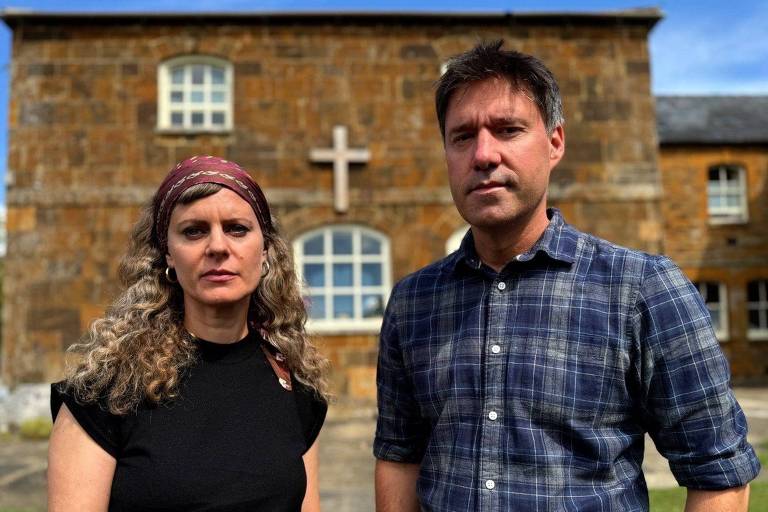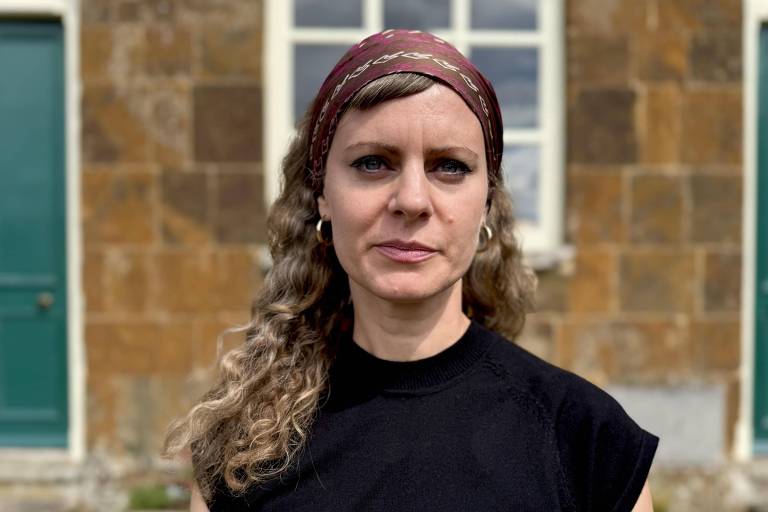Jesus' Army: Survivors reveal the routine abuse of a Christian sect that aspired to create a heaven on Earth

Northamptonshire (England) | BBC Investigations
Hundreds of people are still traumatized by the abuses they suffered at the hands of a former religious movement that has fallen into disgrace.
Jon Ironmonger investigated the group known as the Jesus Army before its closure five years ago. He met with the director of a new BBC documentary series to tell his story.
At first glance, the Jesus Army appeared to be an enthusiastic church in rural Northamptonshire, England .
It had 2,000 or 3,000 members, who wore a flashy military uniform, and had a fleet of rainbow-colored buses.
But the reality was very different.
In 2016, I began a years-long journey to expose one of the UK 's most abusive cults .
At the time, there were already reports of dubious practices and unexplained deaths, such as that of a young man whose body was found on a train line.

Months later, over tea at London 's St. Pancras station, a woman who had fled the group as a teenager revealed the true scale of the cult's damage. She asked to remain anonymous.
"How many victims have contacted you?" I asked her. I expected an answer perhaps in the double digits.
"About 600 or 700," she replied calmly. My mouth dropped open.
Two years of interviews and investigations followed before the BBC published our findings. They detail widespread child abuse and reveal evidence of cover-up by the group's senior leadership.
Formally known as the Fraternity of Jesus, the church closed a year later.
Intrigued by press reports of the unfolding scandal, documentary director Ellena Wood began her own investigation into the Jesus Army in 2022.
She spoke with more than 80 survivors, as well as family members of the victims. Divided into two parts, the film is engaging and, in certain parts, harrowing.
"In many cases, I was the first person they shared their experiences with," she says, "and almost all of them were still traumatized. To a large extent, it was a live process for them."
"One of the things that surprised me was that they describe what we know as sexual abuse , but without understanding it as such, or blaming themselves for it."
"And as a filmmaker, I wanted to convey to the audience that you don't just leave a cult and move on with your life," Wood continues. "It can inform everything about you—your decisions, your thinking, your guilt, your relationships."
Wood says he set out to question assumptions about why people stay in cults.
She compares the situation to the thought of leaving a domestic relationship, compounded by the anguish of abandoning family, friends, money, job, and support system, plus the inherent threat of going to hell.
She says, for example, that one of the group's collaborators, Nathan, "even though he struggled to accept the fact that he had been groomed and sexually abused, admitted that he would probably return to the Jesus Army if it reopened."
For children in particular, life in the cult's many communal houses across central England was intense and fraught with danger.
About one in six children has been sexually abused, according to an analysis of damages claims filed by about 600 individuals.
Children were separated from their parents. They often slept in dormitories alongside aimless travelers and drug addicts.
Many were subjected to daily beatings and endured long sessions of worship, with exorcisms and retractions of sins.

Hearing the survivors' accounts took an emotional toll on Wood.
"I had just become a mother and had two or three-hour long, detailed conversations about abuse, sometimes involving incest," she explains. "Then my son would come home from daycare, and all these mental images would be in my head."
"You're forming these relationships that involve a lot of contact, a lot of comfort, and trying to do right by everyone. So sometimes the burden is really heavy."
After the Jesus Army was disbanded, the BBC revealed that its founder, Noel Stanton (1926-2009), and his so-called five apostles covered up the abuse of women and children by manipulating the reports.
A former elder described the church leader as a "predatory pedophile." He handed me a file full of revelations and accused him of rape and sexual abuse.
Stanton died in 2009, without answering any of the charges.
Wood states that "people were equally terrified and awed by him. The children, especially, were completely terrified."
But was Stanton's cult all bad, or did it start out as something good and turn into something terrible?
"If I had to guess, I'd say the second option," Wood says. "I think the more power Noel had over someone, the more control he felt he needed to have."
"But I think the biggest problem was the underreporting of abuse. Victims were forgotten and often gaslighted . There is no excuse for that."
Ellena Wood knows that many people in the Jesus Army have had positive experiences.
"It wasn't horrible for everyone, all the time," she explains, "and we need to recognize that nothing is black or white in the world."
In a moving scene in the documentary, David, a former elder and strong advocate for the group, breaks down in tears under Wood's careful questioning.
"He recognizes that he needs to start believing that what people have faced is real," she says. "And it was the first time any leader in that church had said that, and it was a very important moment."
The Jesus Fraternity Foundation, which liquidates the affairs of the Jesus Army, said it was shocked by the abuses that occurred and offered an unconditional apology to all those affected.
Last year, a compensation scheme, partly funded by insurance, paid out individual damages to hundreds of victims, averaging around £12,000.
Listen to the episode of the BBC podcast In Detail: The Jesus Army Cult , which inspired this report, on the BBC Audio website .
This text was originally published here .
uol





